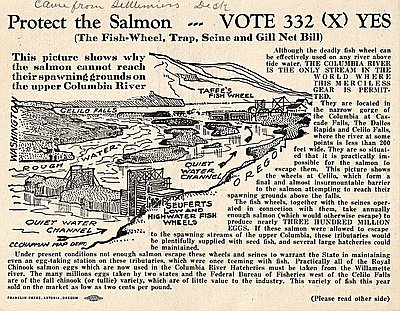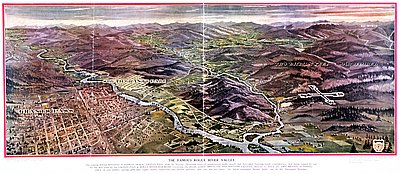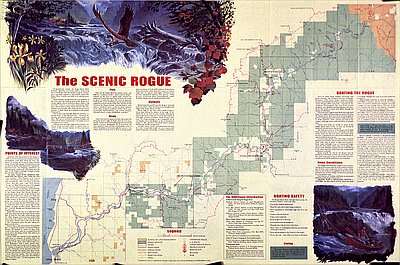- Catalog No. —
- Curry County Reporter, August 15, 1935
- Date —
- August 15, 1935
- Era —
- 1921-1949 (Great Depression and World War II)
- Themes —
- Environment and Natural Resources, Government, Law, and Politics, Sports and Recreation, Trade, Business, Industry, and the Economy
- Credits —
- Oregon Historical Society
- Regions —
- Southwest
- Author —
- Reuben C. Young
News Editorial, Nets vs. Development
The 1935 Curry County Reporter editorial reproduced here marks the final chapter in the conflict between commercial and recreational salmon fishing interests on the Rogue River. This fish fight began in 1910 when the Rogue River Fish Protective Association, a sportsmen’s organization based in Jackson County, successfully backed a statewide initiative that closed the Rogue to commercial fishing.
With both recreational and commercial fishing industries, Grants Pass occupied a middle ground between the recreational fishery of Jackson County and the commercial fishery of Curry County. Grants Pass fishing interests, allying with those at Gold Beach, negotiated a compromise in 1913 that effectively repealed the 1910 initiative, reopening commercial fishing on the Rogue.
Political negotiations between the various fishing factions continued throughout the 1910s and into the 1920s. Alliances between upper river, middle river, and lower river fishermen shifted throughout this period as commercial gillnetters and seiners vied with recreational anglers for what remained of the Rogue’s salmon runs. In 1930, sportsmen, allied with resort interests, put another initiative on the ballot that would have closed the Rogue to commercial fishing. Oregon voters rejected the measure by fewer than 3,000 votes.
By 1935, the political winds had shifted yet again. Early that year, the state legislature passed a bill that once more closed the Rogue to commercial fishing. The Rogue River commercial fishing industry was ailing, and many southern Oregon business interests began to see tourism as a more effective method of turning fish into money, a view encouraged by state plans to develop the Rogue as a recreational Mecca. The Curry County Reporter finally conceded that the “scrap is over and the sooner we drop the old argument the better off we will all be.” The last commercial fishing season on the Rogue was held in 1935, ending a long, bitter conflict.
Further Reading:
Dodds, Gordon B. “The Fight to Close the Rogue.” Oregon Historical Quarterly 60, 1959: 461-474.
Arman Florence, and Glen Woolridge. The Rogue: A River to Run. Grants Pass, Oreg., 1982.
Written by Cain Allen, © Oregon Historical Society, 2002.
Related Historical Records
-
Protect the Salmon - Vote 332 (X) Yes
This card was distributed by the Fish Conservation Committee, a political group organized to promote a 1908 initiative that sought to ban fishwheels and other forms of commercial salmon …

-
The Famous Rogue River Valley
Landscape artist Gibson Catlett created this bird’s-eye view map of Grants Pass in 1911 for a railroad development company that was also selling land in a proposed town …

-
The Wild and Scenic Rogue River
American attitudes toward wilderness underwent an important change over the course of the twentieth century. In the 1930s and 1940s, Aldo Leopold, Robert Marshall, and other well-known conservationists …

